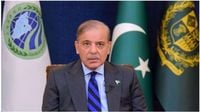ISLAMABAD: Prime Minister Shehbaz Sharif has called an emergency meeting of the National Command Authority (NCA) today, following the Pakistan Army's military operation 'Bunyan Marsoos,' which targeted multiple Indian military bases. This high-level meeting aims to assess the escalating tensions between India and Pakistan, which have reached a war-like situation.
The NCA is Pakistan's apex body responsible for safeguarding national security through command, control, and operational decisions regarding the country’s nuclear weapons program. Chaired by the Prime Minister, the NCA includes key federal ministers—Foreign Affairs, Interior, Defence, and Finance—along with the Chairman of the Joint Chiefs of Staff Committee, the chiefs of the Army, Navy, and Air Force, the Director General of the Strategic Plans Division (SPD), and the Director General of the Inter-Services Intelligence (ISI).
According to security sources, the operation 'Bunyan Marsoos' commenced in the early hours of Saturday, May 10, 2025, and involved precision missile strikes against Indian military installations. The operation's name, which translates to 'a structure firmly joined together,' draws inspiration from an Arabic verse in the Quran, specifically Surah Al-Saff (61-4), which praises those who fight in Allah’s cause as a solid, fortified structure.
Chief of Army Staff General Syed Asim Munir offered Fajr prayers and recited Surah Al-Saff before the operation commenced, invoking divine guidance. The action reflects Pakistan's resolve and collective strength in the face of external aggression.
Pakistan targeted seven sites in India, including the strategic Pathankot air base, Udhampur air base, and Gujarat air base, as well as the Rajasthan air base and a BrahMos missile storage site. Security officials have reported heavy losses on the Indian side, with the destruction of key military infrastructure.
The escalation follows a series of violent incidents, including a recent terror attack in Pahalgam, where 26 civilians, including a Nepali national, were killed by terrorists from 'The Resistance Front,' an offshoot of the Pakistan-backed Lashkar-e-Taiba. In retaliation, India launched attacks on terrorist camps in Pakistan-administered Kashmir under Operation Sindoor, claiming to have killed 100 terrorists.
As tensions mounted, India also responded with missile strikes on Pakistani airbases and air defense systems, claiming major damage to Pakistani military capabilities. Over a dozen Indian civilians have lost their lives due to indiscriminate Pakistani shelling along the Line of Control (LoC) and international borders.
In a surprising twist, Pakistan's Foreign Minister Ishaq Dar later denied that a meeting of the NCA had been convened, despite earlier reports. This denial came shortly after U.S. Secretary of State Marco Rubio held calls with both Indian External Affairs Minister S. Jaishankar and Pakistan’s Army Chief General Asim Munir, urging both nations to de-escalate tensions and re-establish direct communication.
Rubio emphasized the importance of avoiding miscalculations that could lead to further conflict, offering U.S. assistance in facilitating constructive talks. China also issued a statement urging both India and Pakistan to prioritize regional stability and avoid actions that could exacerbate the situation.
According to Tilak Devasher, an author and former member of India’s National Security Advisory Board, the initial announcement of the NCA meeting may have been an attempt by Pakistan to trigger international diplomatic pressure. He speculated that it could be a psychological move aimed at scaring the international community into intervening.
The situation remains tense as both nations continue to exchange fire along the LoC, with reports of ongoing ceasefire violations. Pakistan's military confirmed that three of its air force bases were struck by explosions, leading to an immediate nationwide airspace shutdown for civilian and commercial flights.
The Nur Khan Air Base in Rawalpindi, a key military compound less than 10 kilometers from Islamabad, was among those affected, along with the Murid air base in Chakwal city and the Rafiqui air base in the Jhang district of Punjab province.
As the military operation continues, the Pakistan Air Force remains on high alert, with airspace across the country closed until noon today as a precautionary measure. The escalation in military actions and the high-stakes political climate underscore the fragile state of relations between the two nuclear-armed neighbors.
With both sides engaging in military operations and retaliatory strikes, the international community watches closely, hoping for a resolution to prevent further escalation. The potential for conflict remains a pressing concern for regional stability, with calls for diplomacy and dialogue growing louder.






